 Here's a small item from recent days which led me to 'new' discoveries online, mostly stuff from the sites of Traunstein and Sankt Oswald parish, which will require another post.
Fire hits Pope Benedict's
Here's a small item from recent days which led me to 'new' discoveries online, mostly stuff from the sites of Traunstein and Sankt Oswald parish, which will require another post.
Fire hits Pope Benedict's
old boarding school

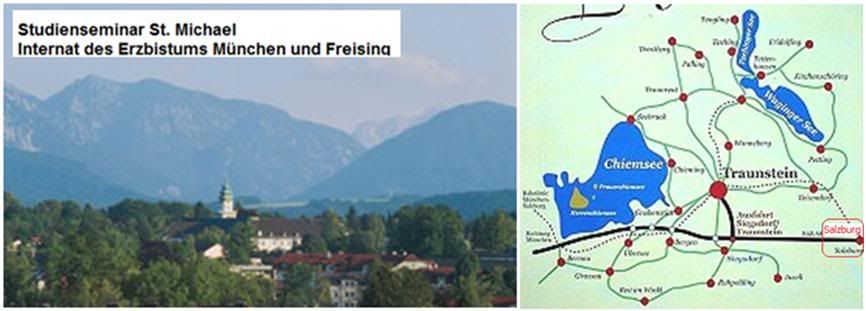
Traunstein, Germany, Sept. 30 (dpa) - A boy playing with fire nearly burned down Pope Benedict's old boarding school in Germany, police said Wednesday. Fire crews rushed to St Michael's College after an electronic fire alarm detected smoke in the building late Tuesday.
A pupil, 18, who had burned part of a papier-mache egg carton for fun had then thrown it on a stack of paper with an edge still glowing. The rest of the paper began to smoulder.
Fire brigades quickly put out the fire, police in nearby Rosenheim said, and the damage was slight, but 30 boarders needed treatment after inhaling smoke.
Joseph Ratzinger, now Benedict XVI, boarded at the Catholic school from 1937 until it was closed down by Nazi authorities during the Second World War. At the time it was known as the Archdiocesan College of Traunstein.
St Michael's currently has 70 boarding pupils.
The following article was written for Catholic Digest on the occasion of the Pope's visit to the United States in April 2008 and previously posted in the PRF. It's a beautiful read!
Can a Pope's childhood roots
shape a Church?
BY KATHLEEN STAUFFER

BAVARIA, GERMANY - Unsullied by time, the picture-postcard landscape unfolds in visual cliché: Immense round hay bales balance in bucolic fields. Red geraniums pour from flower boxes hanging from windows of whitewashed chalets. Brown cows graze calmly on grass so green it glints yellow in sunlight. Trees brood blackly in the shade. A craggy horizon of pale purple Alpine peaks reaches as far as the eye can see.
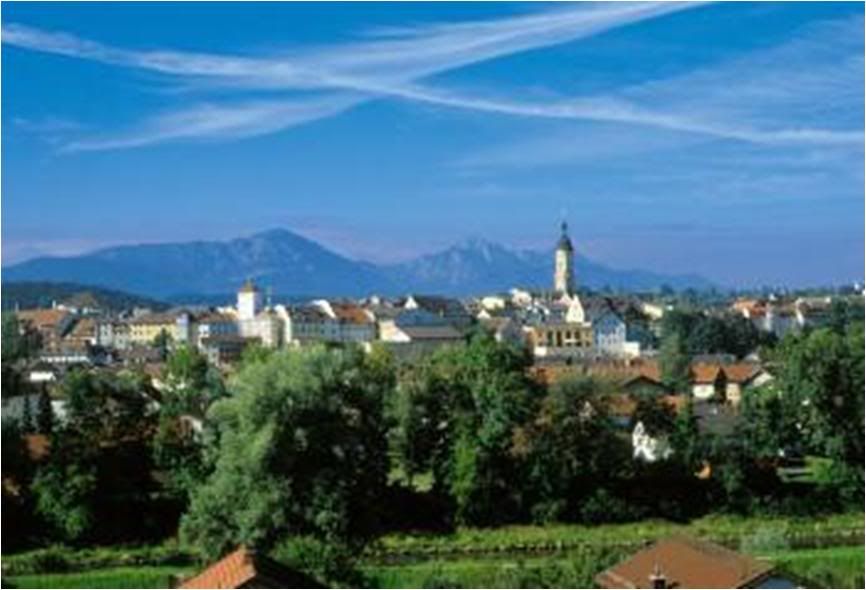
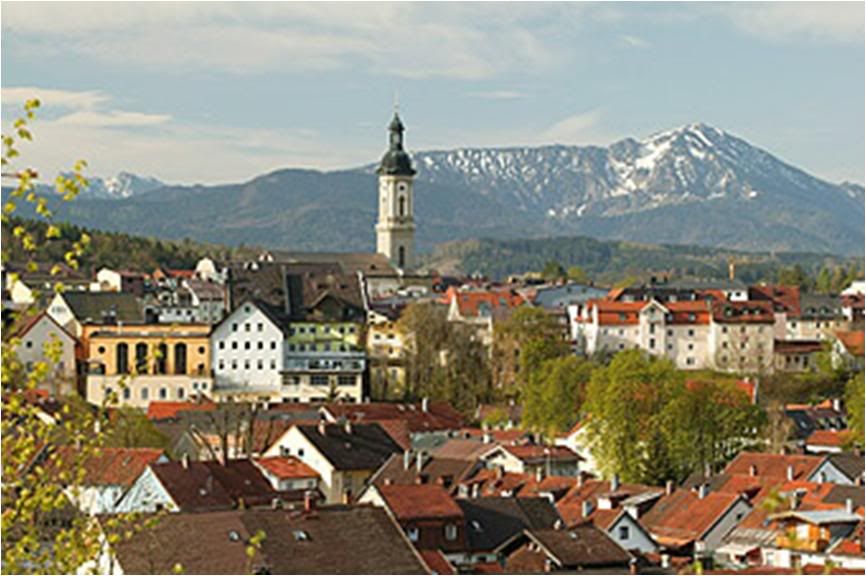 Panoramas of Traunstein, dominated by the steeple of St. Oswald parish church, where Joseph Ratzinger offered his first Mass.
Panoramas of Traunstein, dominated by the steeple of St. Oswald parish church, where Joseph Ratzinger offered his first Mass.
It’s almost as if change knocked at Bavaria’s door and, unlike the rest of the West, Bavaria said no thanks. Though the region is known for its folksy hospitality, friendly Bavarians won’t say “hello”; or “guten Tag,” they’ll say “Grüß Gott” (“Greetings, in God’s name”). Enter a shop to buy an Alpine hat in Oberammergau, and before asking if you need help, the shopkeeper will smile, “Grüß Gott.”
Faith is the sustenance to which Bavaria cleaves: More than half its citizens identify as Catholic, and by some measures the figure could be as high as 70 percent. In Regensburg, where Professor Josef Ratzinger taught university theology from 1969 until he was appointed Archbishop of Munich and Freising in 1977, 83 percent of residents are Catholic.
There’s no separating Pope Benedict XVI, leader of the world’s 1.1 billion Roman Catholics, from his native land. His philosophical roots remain planted in fertile, faithful, hardworking Bavaria — Germany’s most economically productive region. “My heart beats Bavarian,” he once told a flock of reporters in Rome.
Father Markus Moderegger grins indulgently, head tilted toward the ceiling. The thin, bespectacled rector of the Student Seminary of St. Michael in Traunstein, where Josef Ratzinger lived his high school years, acknowledges the thundering soles of boys running overhead. The young priest shrugs. "Tomorrow is the first day of school…”
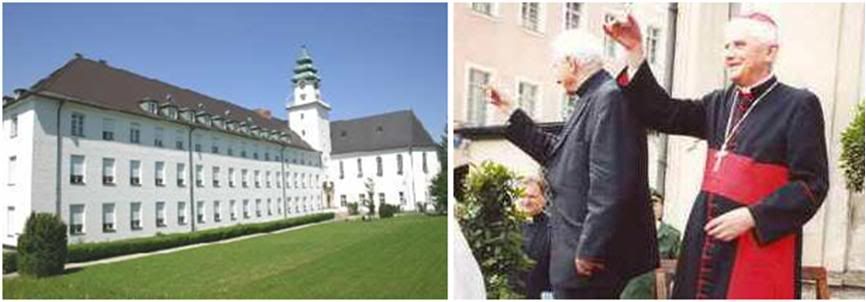 Cardinal Ratzinger's last visit to Traunstein and St. Michael's, with his brother Georg, in 2002.
Cardinal Ratzinger's last visit to Traunstein and St. Michael's, with his brother Georg, in 2002.
St. Michael Seminary is a dormitory built to encourage vocations. Saving souls and forming souls, along with a healthy indulgence in sport, were its mainstays even when young Josef Ratzinger lived here in the 1940s. Gold- and silver-plated soccer trophies fill a case in the hall.
Opposite the sports board hang photocopies of German press clippings. There’s no whitewashing here. The articles chronicle controversies surrounding the newly elected Roman Catholic pope. Hints of a Nazi past. Explanations of how the teenage Josef Ratzinger ended up briefly joining the Hitler youth. It’s a candid collection, aimed at encouraging discussion.
But St. Michael’s most famous graduate wouldn’t likely have come boisterously down the stairs. Still smiling, Moderegger explains that Ratzinger didn’t like sports and didn’t even like life in Traunstein, population 18,000, when he first arrived.
“He grew up in a humble farmhouse, very close to his family. This was so different from his life in the country.” Ratzinger hails from a typical Bavarian family, with ties that bind.
Yet the food for thought posted on the bulletin board hints at the deeper story. It was here that Josef Ratzinger first encountered the art of theological polemics and academic disputation. And, he liked it.
Up at 5 a.m., Mass at 5:30, next a Bible study and a quick bite to eat before heading off to school — such a life might not suit every young man, but it suited the future pope once he began meeting like-minded friends at St. Michael.
From the beginning, by all accounts, the introverted Pope liked a good debate that required him to use his wits. What he lacked competitively on the soccer field he made up for in the classroom. Josef Ratzinger grew to love St. Michael, returning annually for extended stays and vacations right until the day he became pope.
Widmar Tanner was a vice president of the University of Regensburg and a full biology professor when Professor Josef Ratzinger served as co-vice president with him from 1975 to 1976. Tanner represented the college of sciences; Ratzinger, who’d been ordained in 1951 and earned his doctorate in theology from the University of Munich in 1953, headed up the college of humanities.
“We were told when he was presented that he was one of the great theologians of Germany.” Tanner’s personal encounters with the newly appointed vice-president reinforced the rumors.
Though Ratzinger proved formidable with an argument, Tanner fondly remembers his colleague. “He was very friendly. He was an exceptional speaker, but he was very modest. He stayed in the background. But when he made his argument, he made it brilliantly. We had great respect for him as a leader in his field.”
Tanner chuckles. “When we had arguments against each other, he usually won!”
The halls at Regensburg buzzed when Cardinal Ratzinger was elected pope on April 19, 2005. Tanner says those who knew Benedict XVI held a different opinion than those who did not.
“On the day he was elected, people were critical. For many years he had been prefect of the Congregation for the Doctrine of the Faith. Since then, you hear people talk about him changing or softening, but I don’t think he’s changed.”
While others talked that spring of having an inquisitor for a pope, Tanner remained silent. Knowing him, I didn’t speak of him in this way. When people take on more responsibility, they often change. They have to change. But I would say that, rather, in my short time of knowing him, he did lead me to think that he is capable of listening and conciliation.”
Father Rupert Berger, retired professor of liturgy science at the University of Freising, sits in his study in a small parish house in Traunstein. A newspaper lies open on his dining-room table, and a homey jumble of books and papers cluttering the room pegs him for an academic. A pair of glasses resting on the outspread newspaper suggests he has been following Pope Benedict’s travels here in Bavaria. For Berger, the news stories evoke mixed emotions.
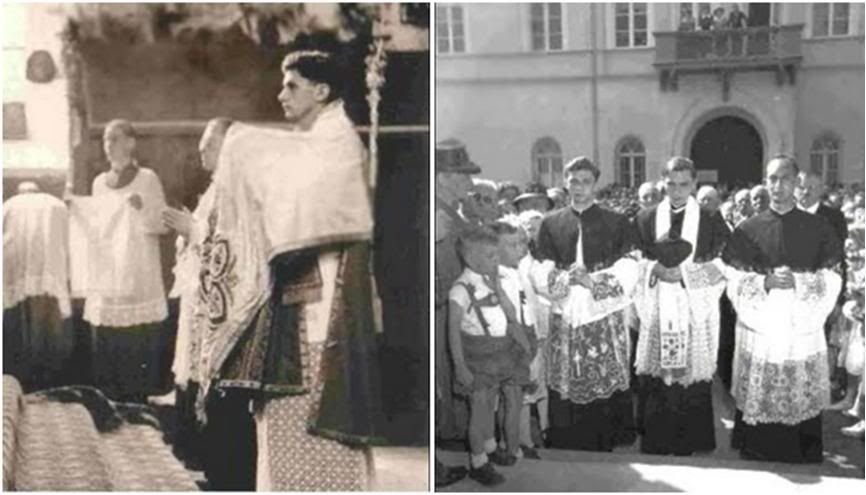 Although they were ordained together on June 29, 1951, the three friends held their first Mass on different days. Fr. Berger came first, on July 1, with Joseph and Georg serving him as subdeacons. The two brothers celebrated their Primiz one week later.
Although they were ordained together on June 29, 1951, the three friends held their first Mass on different days. Fr. Berger came first, on July 1, with Joseph and Georg serving him as subdeacons. The two brothers celebrated their Primiz one week later.
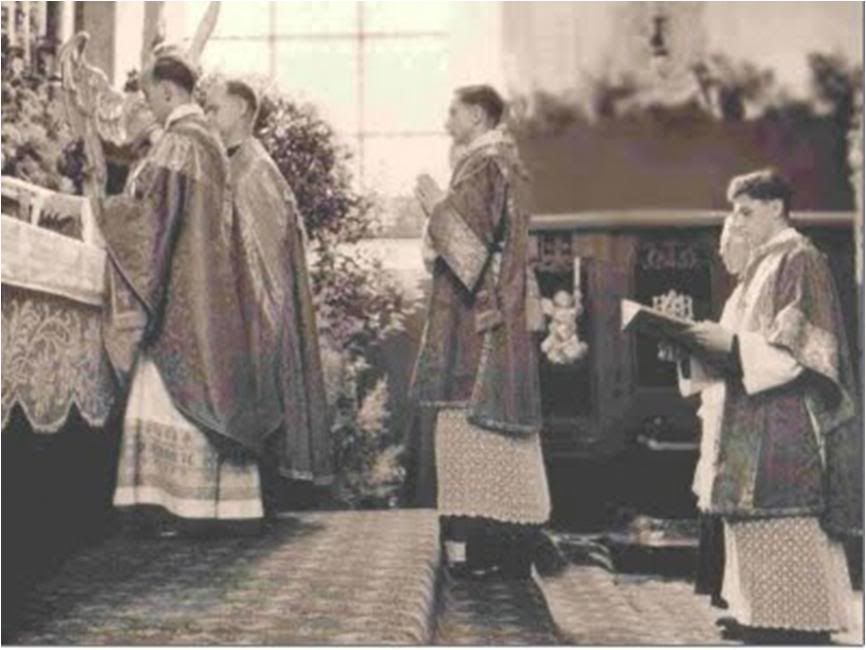
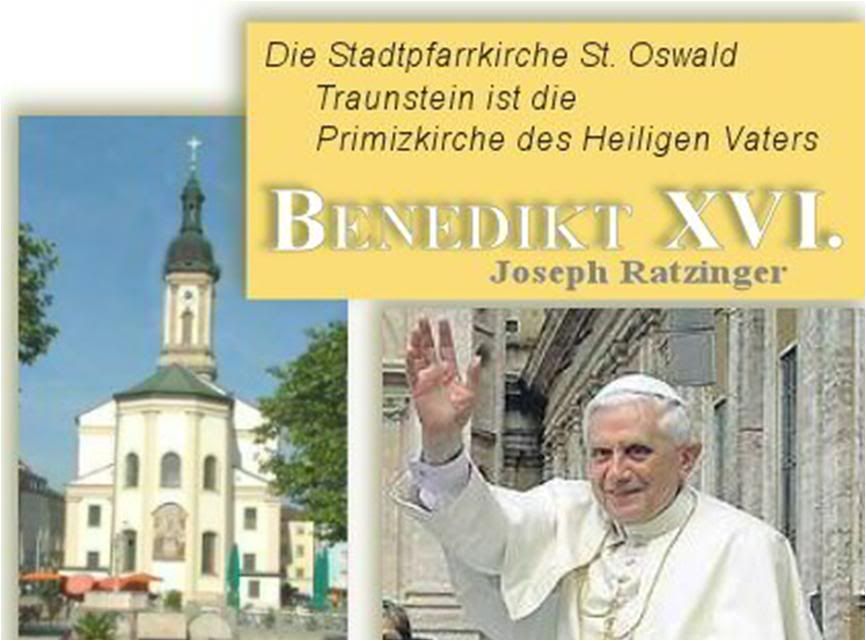 St. Oswald parish rightfully prides itself as Benedict XVI's 'Primizkirche'.
St. Oswald parish rightfully prides itself as Benedict XVI's 'Primizkirche'.
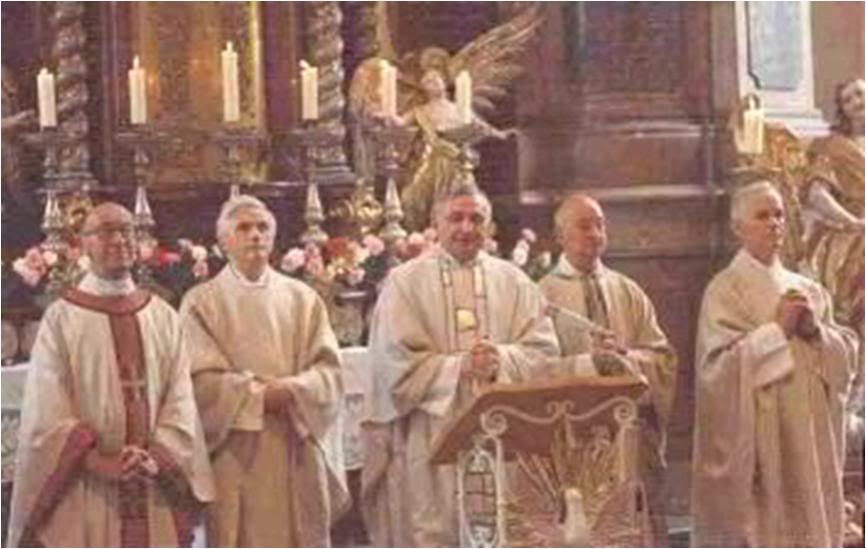 The three friends concelebrate Mass at St. Oswald's in 1976 to mark the silver jubilee of their ordination. From left, Prof. Michael Muellner from the seminary, Joseph Ratzinger, Georg Ratzinger, Rupert Berger, and the then parish priest Georg Els.
The three friends concelebrate Mass at St. Oswald's in 1976 to mark the silver jubilee of their ordination. From left, Prof. Michael Muellner from the seminary, Joseph Ratzinger, Georg Ratzinger, Rupert Berger, and the then parish priest Georg Els.
Josef Ratzinger, Rupert Berger, and Ratzinger’s older brother Georg attended seminary and were ordained together in 1951. The Pope is one of Berger’s closest friends. Often, they concelebrated Mass at St. Oswald, the village church here, and then went afterward to the pub next door.
Berger would have a glass of wine, but Josef Ratzinger usually drank water. “He doesn’t like it,” shrugs Berger when asked why the future pope rarely indulged in something stronger.
In those postwar days, there were no typical teenage high jinks.The seminary in Munich had been bombed to ruins. Seminary candidates were charged with clearing the site for rebuilding. Rupert, Josef, and Georg staggered under the weight of wheelbarrows laden with chunks of concrete and shards of steel. In payment, they received rations from the Marshall Plan: rice, cornbread, grains, and cereals. It was strange fare to youth accustomed to bratwurst and potatoes.
But they were grateful to have food at all. “We didn’t get into trouble not because we were good boys,” said Berger, “but because we were so relieved to have survived the war and to have found ourselves back in school.”
Josef was even slighter than his friend and his brother, but he hoisted and pushed load after load of rubble without complaint. All the while, the boys attended lectures in anticipation of taking high school graduation exams. They were all good students. “But he was always the best.”
Regulations also required the boys to submit to “re-education” during the Allied occupation of post-World War II Germany. Berger says they didn’t mind the repatriation.
“The lectures were really interesting. We had lived through these things (the atrocities the Allied indoctrination underscored). We had seen it all for ourselves!”
Was Josef Ratzinger ever a sympathetic member of the Hitler youth, as some reports imply?
Berger sits forward in his chair and waves his arms. “Nein, nein, nein — no, no, no.”
“We were not Nazis! Quite the opposite!” Berger’s father, also named Rupert, had been a leader in the Nazi resistance from the early days of Hitler’s regime and spent six months in Dachau for his work in the Bavarian People’s Party. Afterward, the family was banished from Traunstein.
Even as a young seminarian, Josef Ratzinger made an impression. “We all admired [Josef] because he worked so hard,” continues Berger. “We would go for walks, but he never joined us forentertainments. He sat at his desk and read all the time.”
In a region noted for its industry, Ratzinger proved even more industrious than your average Bavarian. Berger would have to drag his friend from the books to gain a social companion for an afternoon. A lot of the seminarians liked ballet, but Ratzinger didn’t care for it and neither did Berger. Once or twice a month, though, Ratzinger could be persuaded to visit the theater for a play or an opera.
Ratzinger’s bookishness goes hand in hand with his introversion. Berger says Ratzinger always was friendly but left others to make the introductions. “His privacy is extremely important to him.”
Yet the Pope is hardly humorless. Berger, with great amusement, points out that
we have a joyful pope, not a comedian. “He loves to laugh, but he is not the one who tells the jokes!”
The two pals have not met since Cardinal Josef Ratzinger became Pope Benedict XVI. Prior to Benedict’s papacy, they annually spent time together during Ratzinger’s extended vacations in Traunstein.
On his visits, Ratzinger bunked at St. Michael, where his love for books and his passion for priesthood first converged. His brother Georg always joined him.
In the evening, Josef would read the paper to Georg, whose eyesight is reportedly delicate. Then Georg, an accomplished pianist, would begin working the piano while Josef turned on the lamp in the room across the hall and got down to business.
Father Markus Moderegger stretches one palm above the other, about 15 inches apart. “He always brought work with him, a big stack of papers.”
The Sisters who handle St. Michael’s housekeeping miss the beneficent Ratzingers. Both brothers regularly hiked into Traunstein. “You would see their two white heads going off down the road. When they returned, they carried sacks of presents. They’d gone shopping. For the Sisters!”
In a simpler world, these intimate vacations would continue. But modern security concerns and an international press corps make such dreams impossible.
Could Rupert Berger pick up the phone just now and call his friend, the pope? Berger’s smile is slow and warm and fond and sure.
“Yes, I think so. I am very careful with the word friend. There are really only very few people you can call your friends in life. The pope is one of mine.”
The world doesn’t yet understand Benedict XVI. Is he the shy academic who brushes away his security detail to hold a young altar server’s face in his hands while she throws out her arms for a bear hug? Or is he the hardworking Vatican watchdog whose Traunstein housekeepers cry because he no longer can visit?
With Benedict, you get equal helpings of Bavarian geniality and Bavarian self-discipline. You get singular intelligence and deep affection in the same man.
“What people who know him admire is that he is so bright and so pious. This combination you just don’t find very often,” Berger says. “And I admire his sermons because they come from the heart inspite of his living so much in the head.”
Hand-cut stacks of wood nestle tidily beside each doorstep of every home in the rolling Bavarian hills, a testament to hearth, family, and a diligence and conformity that mirror the inner world of the current pope.
Bavarians embrace the rigors of life and its comforts too. Warm pretzels and warm beer equal warm hospitality. Hard work and hard winters are God’s reminder that life requires serious toil amid the play. Some things don’t change because they aren’t meant to change. “Grüß Gott.”
Father Berger and Professor Tanner assess the new pope similarly. Berger sees both orthodoxy and flexibility going hand-in-hand. “Whatever job he is given, he adapts to the task. As a cardinal, he adapted. As a pope, he is a completely different man than the Defender of his Faith. He is always open. He is always learning and adapting.
“To touch the children, to wave — he learned this from his predecessor.” But Berger jumps a little in his chair when asked if this change will be reflected theologically.
When the pope’s friend speaks of change, he is talking not about the essence of theology but about the essence of human behavior. Such precision with phraseology is a rhetorician’s domain, and it is here where Benedict and his friend Berger feel most at home.
The pope has been known to speak with a lover’s yearning about missing his academic debates, mourning his loss of time for theological endeavor.
In the speech in Regensburg, where the Pope compared Christian relativism to Muslim fundamentalism, using a stark (and to orthodox Muslims, offensive) illustration, he perhaps intended to spark a dialogue between the two faiths.
Clearly, he was warning both Christians and Muslims to guard against deferring to the self ’s rationalizations in living their faiths: It’s not what makes sense to us but what makes sense to God that matters. For Benedict, being a little bit Catholic is like being a little bit Bavarian: There’s no such thing.
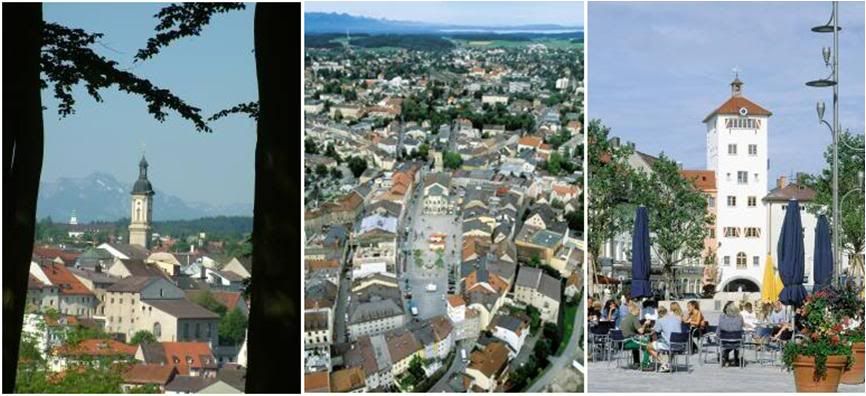 A sidebar to the article:
Does the pope like beer?
A sidebar to the article:
Does the pope like beer?
Not really. Press reports that Pope Benedict XVI likes his beer are inaccurate, says the Pope’s longtime friend Father Rupert Berger.
“He doesn’t like the taste of alcohol,” Berger says with a shrug. “He just never did.” At home, the Pope drinks orange juice.
But never let it be said that Benedict XVI is a party pooper. “On special occasions, when everybody else is having a drink, he will join in so he doesn’t spoil the fun.”
Then, the pope will sip a radler, or what Germans call a bicycler. The drink, a combination of beer and lemonade, derives its name from the source of its invention: In the 1920s, Alpine bicyclists wanting to avoid wobbling along the twists and turns of a long ride diluted their beer at lunchtime to avoid riding under the influence.
Radler recipe
•½ glass of lemonade
•½ glass of German beer
Mix gently and serve.
(serve at room temperature — as is the German custom.)
[Modificato da TERESA BENEDETTA 02/10/2009 14:01]